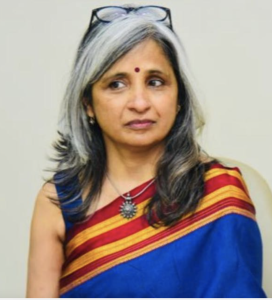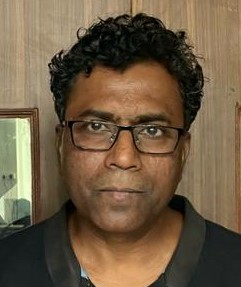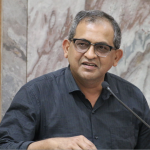ESG Team
Trustees

Bhargavi S. Rao graduated in Environmental Science and is a Botanist with an M’Phil degree in Aerobiology from Bangalore University. She also has a post graduate diploma in Journalism. Her initial research experience was in the areas of Microbiology and Cell Biology and she has worked at the Microbiology and Cell Biology Department of the Indian Institute of Science, Bangalore. She has co-authored research papers in journals like Current Science and Virology. She has had teaching experience as a lecturer in Botany and Microbiology at The BMS College for Women, Bangalore and also as a high School Teacher in Geography and Economics at the Sri Aurobindo Memorial School, Bangalore.
Her interest in Environmental and Social justice issues brought her to Environment Support Group (ESG), where she has led a wide variety of research and educational projects and campaign initiatives. She coordinated educational and training programmes at ESG with a focus on enhancing awareness and critical engagement in social and environmental justice issues. She has co-worked as Coordinator and Faculty of the India sector of the ‘Cities of the 21st Century’ and ‘Health and Community’ courses of the International Honors program, a study abroad program from 2002-2009, and as Co-Director of the India Centre of the Minnesota Studies in International Development, a division of the Learning Abroad Centre of University of Minnesota, USA (2014-2017).
Bhargavi has also been a guest faculty at the Simpson Centre for Humanities, Washington University, Seattle in 2013. She has been a co-speaker at many of the talks and workshops on the issues of Environment and Social Justice in Universities across USA, Germany, Vietnam and China. In recognition of her long-standing contribution in the voluntary sector, the Association for India’s Development has awarded her the AID “Saathiship” (2010-2013).
Her interests include Environmental Education, Experiential Education, Environmental health, Biodiversity, Traditional and Indigenous knowledge, Governance, Gender Issues, Law, Public Policy and Urban and Community studies.
As Senior Fellow, Bhargavi is involved in overseeing research and educational efforts. As Trustee, she is also a member of the organisation’s Executive Committee. She has worked with Centre for Financial Accountability, Public Health Foundation of India and Azim Premji Philanthropic Initiatives.
Email: bhargavi @esgindia.org

Robert John Chandran is currently an Associate Professor of Biological Sciences at the Indian Institute of Science Education and Research, Kolkata, India. His research interests are primarily in tropical forest community ecology, grassland ecology, landscape ecology, biodiversity, conservation biology, wildlife ecology, and forest management. He also has extensive teaching responsibilities in core subjects in biology, ecology, and quantitative analyses to undergraduate, masters, and PhD students.
After earning two Masters degrees in Chemistry at the Indian Institute of Technology, Delhi, he decided to switch to working on tropical forests. He earned a PhD at the Indian Institute of Science, Bangalore, for his work on the community ecology of a tropical dry deciduous forest, in southern India. Thereafter he did post-doctoral research in the United States at the University of Georgia, Athens, the Smithsonian Tropical Research Institute, and the University of Illinois, Urbana-Champaign, working with a global network of tropical forest ecologists and research across several countries.
His professional interests grew not only out of a dedication to protecting species, ecosystems, and the environment, but also a deep interest in how ecosystems are organized and how they function across multiple spatial scales.
He studies how species diversity is organized and maintained at multiple spatial scales, focusing on plant diversity, plant life histories, environmental variation, spatial structure, demographic processes, dispersal limitation, and succession. He also works on generating knowledge to conserve species and habitats, ranging from the influence of fires and invasive species to understanding the anthropogenic drivers of landcover/land-use change in ecologically rich landscapes. While such research is of fundamental importance to ecology, he argues that it is also increasingly relevant for responding to current challenges in conservation emanating from habitat degradation and loss, as well as environmental change. A long-term goal is to integrate the drivers of ecosystem changes, development imperatives, and livelihoods to create a framework for sustainability.
He is the author of numerous publications in high-impact journals and actively provides mentorship to undergraduate, masters, and PhD students, as well as post-doctoral fellows in academic research.
Email: robert.john @iiserkol.ac.in

Leo F. Saldanha is full-time Coordinator and also Trustee of ESG. He has gained wide-ranging experience in the areas of Environmental Law and Policy, Decentralisation, Urban Planning and a variety of Human Rights and Development related issues, working across many sectors for over a decade. He is a keen campaigner on critical environmental and social justice issues and has guided several campaigns demanding evolution of progressive laws and effective action. He has creatively supported various distressed communities to secure justice through public interest litigations and advocacy efforts, arguing as party in person several public interest litigations, many of which have resulted in remarkable judgments. He has a background in Environmental Science.
Leo has been invited as a speaker by organisations and universities across the world, and in August 2010 was invited to speak at the International Forum on China’s Rural Reform in the 12th Five-Year Plan Period organised by the Chinese Institute for Reform and Development. He assists various Government agencies in evolving law and policy relating to environmental justice. In recognition of his contribution to environmental and social justice efforts, Association for India’s Development, USA, made him their first AID Saathi.
In 2007, he co-authored “Green Tapism: A Review of the Environmental Impact Assessment Notification-2006” (2007) with team members at ESG. He has since co-authored “Tearing through the Water Landscape: Evaluating the envionmental and social consequences of POSCO project in Odisha, India” (2011), “Forfeiting our Commons: A Case for Protecting and Conserving Challakere’s Amrit Mahal Kavals as Livelihoods-Supporting, Biodiversity-Rich and Ecologically-Sensitive Grassland Ecosystems” (2013), and a comprehensive review report of Environmental Decision Making in Karnataka State, in particular the State Environmental Clearance Committee (2014), amongst others. His papers and articles have appeared in many leading new papers, journals and magazines. Recently, he has contributed papers in “India’s Risks: Democraticing the Management of Threats to Environment, Health and Values” (OUP, 2014) and “Living Rivers, Dying Rivers” (OUP, 2015).
Leo facilitates a variety of learning programmes on environmental and social justice concerns for a wide range of audiences. He was the Country Coordinator and Faculty of the “Cities in the 21st Century” and “Health and Community” courses of the International Honours Programme, USA (2002-2009) and has worked as Co-Director of the Minnesota Studies in International Development, University of Minnesota (2014-2017).
In recent years, Leo is a key participant in global research efforts, such as the Governance of Sociotechnical Transformations in collaboration with Harvard Kennedy School, Helmholtz Centre for Environmental Research, and similarly in the multi country Comparative Covid Response project led by Harvard Kennedy School and Cornell University.
Leo is full time Coordinator of ESG and a Trustee member of the Executive Committee.
Email. leosaldanha @esgindia.org

